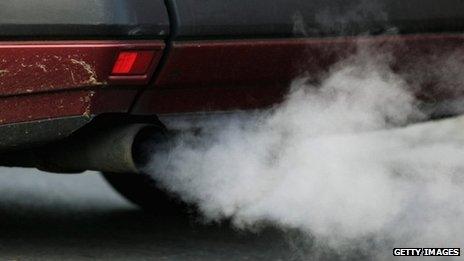Oxford city centre to become low emission zone on 1 January
- Published

Oxford's low emission zone will be only the second to be introduced in the UK outside of London
Oxford city centre is to become a low emission zone (LEZ) from 1 January 2014 under council plans, external.
The plan is a bid to improve air quality and reduce transport-related emissions, said Oxford City Council and Oxfordshire County Council.
The LEZ will only apply to buses which account for up 80% of the pollution in the city centre, authorities said.
Oxford's LEZ will be the second to be introduced in the UK outside of London.
Labour councillor John Tanner, of Oxford City Council, said buses would also be banned from keeping their engines running for more than one minute at a bus stop.
Mr Tanner said buses which break the rules could lose their operator licence, granted by the Traffic Commissioner.
"Oxford City council will continue to press for other improvements until nitrogen dioxide pollution is below 40 parts per million everywhere in the city," he added.
'Minimal effect'
Conservative councillor David Nimmo Smith, cabinet member for environment on Oxfordshire County Council, said the city had some of the highest bus use in the UK.
"Buses are vital to Oxford's economy and environment so I'm delighted to see the LEZ coming into effect to make the city's buses even cleaner," he added.
However, the Oxfordshire Green Party said the new LEZ didn't go far enough.
"A LEZ is long overdue - air quality is continuing to deteriorate in the city centre," said Green group leader Craig Simmons.
"Our concern is that the limited measures proposed will have a minimal effect.
"It applies only to buses, many of which were already in service last year, when air quality again declined. And there are several exemptions."
Mr Simmons said a "clear plan" to extend the LEZ to cover all polluting vehicles was needed.
The city council said the LEZ was developed in response to Oxford City Council's last Air Quality Action Plan (AQAP 2006), external.
- Published14 September 2013
- Published11 July 2013
- Published19 June 2013
- Published13 February 2013